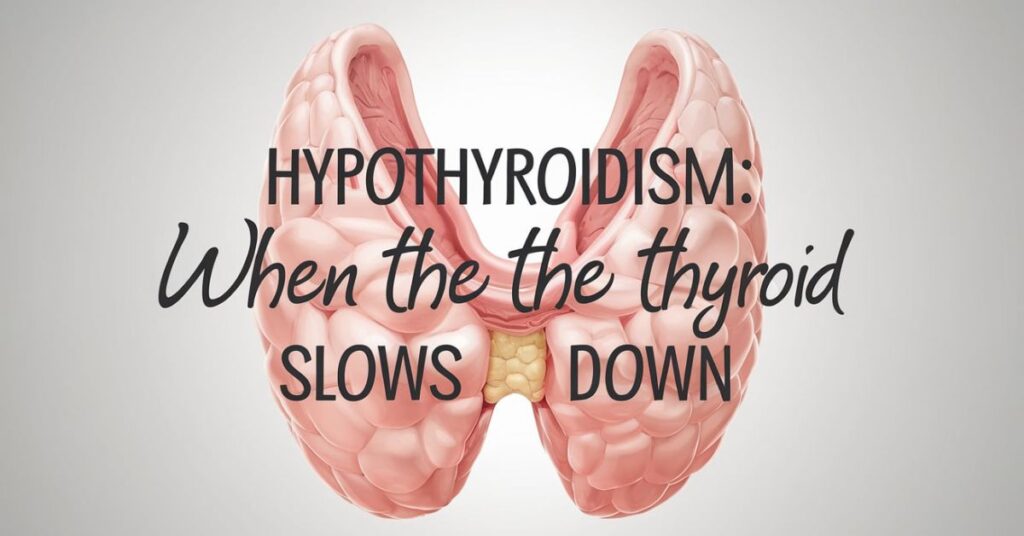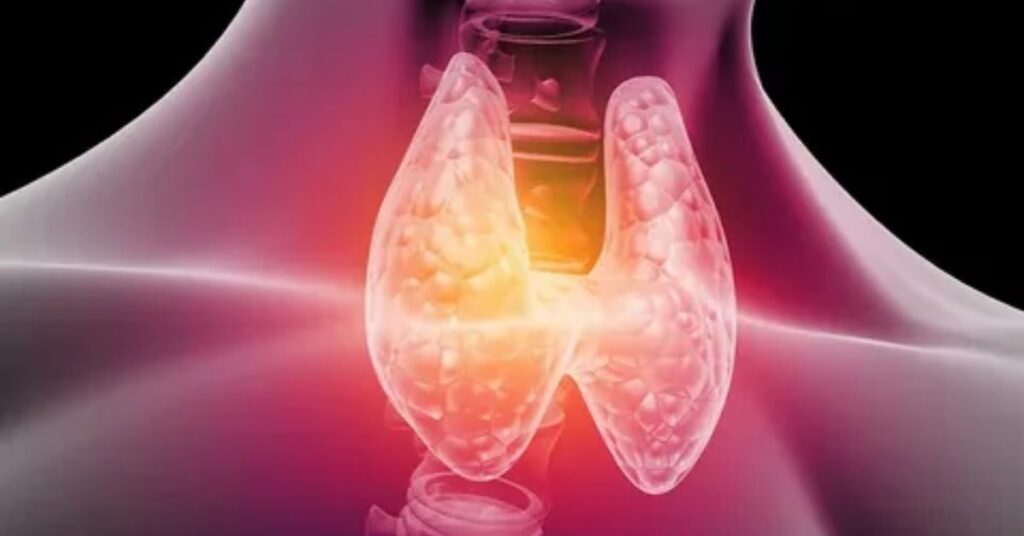The Thyroid gland is a small, butterfly-shaped endocrine gland located at the base of the neck. This remarkable organ is responsible for producing two crucial hormones: triiodothyronine (T3) and thyroxine (T4). These hormones are essential for regulating a wide range of bodily functions, including metabolism, energy levels, body temperature, heart rate, and mood.
The thyroid gland operates in a delicate balance, responding to signals from the pituitary gland and the hypothalamus to maintain optimal hormone production. When this balance is disrupted, it can lead to a variety of thyroid disorders, each with its own unique set of symptoms and health implications.
Thyroid disorders can have a significant impact on an individual’s overall health and well-being. Understanding the role of the thyroid gland and the various types of thyroid disorders is crucial for effective management and prevention.
Hyperthyroidism: When the Thyroid Runs in Overdrive
Hyperthyroidism is a condition in which the thyroid gland produces an excessive amount of thyroid hormones, leading to a range of physiological and psychological symptoms. This overproduction can be caused by a variety of factors, including autoimmune disorders, such as Graves’ disease, as well as non-autoimmune conditions like toxic nodular goiter.
Individuals with hyperthyroidism may experience a rapid heartbeat, unexplained weight loss, increased appetite, sweating, anxiety, and irritability. In severe cases, the condition can also lead to protruding eyes, a condition known as exophthalmos, which is commonly associated with Graves’ disease.
Effective treatment for hyperthyroidism often involves medication, such as antithyroid drugs or beta-blockers, which help to regulate the thyroid gland’s hormone production. In some cases, radioiodine therapy or thyroid surgery may be necessary to manage the condition.
Hypothyroidism: When the Thyroid Slows Down

Hypothyroidism, the counterpart to hyperthyroidism, is characterized by an underactive thyroid gland that produces insufficient amounts of thyroid hormones. This can lead to a wide range of symptoms, including fatigue, weight gain, depression, constipation, and dry skin.
The most common cause of hypothyroidism is an autoimmune disorder known as Hashimoto’s thyroiditis, in which the body’s immune system attacks and damages the thyroid gland. Other potential causes include iodine deficiency, certain medications, and previous thyroid surgery or radiation therapy.
Treating hypothyroidism typically involves the use of synthetic thyroid hormone replacement therapy, often in the form of levothyroxine. This medication helps to restore the body’s thyroid hormone levels, alleviating the symptoms associated with the condition.
Hashimoto’s Thyroiditis: An Autoimmune Thyroid Disorder
Hashimoto’s thyroiditis is an autoimmune disorder in which the body’s immune system mistakenly attacks and damages the thyroid gland, leading to hypothyroidism. This chronic condition is the most common cause of underactive thyroid in the United States and other developed countries.
Individuals with Hashimoto’s thyroiditis may experience a range of symptoms, including fatigue, weight gain, muscle weakness, depression, and goiter (an enlarged thyroid gland). In some cases, the condition can also lead to hypothyroidism, where the thyroid gland is unable to produce sufficient amounts of thyroid hormones.
Treatment for Hashimoto’s thyroiditis typically involves thyroid hormone replacement therapy, which helps to restore the body’s thyroid hormone levels and alleviate the associated symptoms. In some cases, anti-inflammatory medications or other therapies may be prescribed to manage the autoimmune component of the disorder.
Thyroid Tumors and Growths
The thyroid gland can also be affected by the development of various types of thyroid tumors and growths, ranging from benign to malignant (cancerous). These include thyroid nodules, thyroid adenomas, and thyroid cancer.
| Type of Growth | Description |
| Thyroid Nodules | These are the most common type of thyroid growth, and they can be either fluid-filled cysts or solid masses. While the majority of thyroid nodules are benign, some may produce excess thyroid hormones, leading to hyperthyroidism. |
| Thyroid Adenomas | These are benign tumors that originate from the thyroid gland’s cell layer. These growths can also cause hyperthyroidism if they begin to secrete excessive amounts of thyroid hormones. |
| Thyroid Cancer | This is a more serious condition that can occur in the thyroid gland. There are several different types of thyroid cancer, including papillary, follicular, anaplastic, and medullary thyroid cancer. Thyroid cancer can often be treated successfully, especially when detected early. |
Understanding the different types of thyroid growths and their potential impact on thyroid function is crucial for effective diagnosis and management.
Thyroid Disorders and Women’s Health

Thyroid disorders disproportionately affect women, with autoimmune thyroid diseases being the most common endocrine disorders in women of childbearing age. The fluctuations in female hormones during various stages of life, such as puberty, menstruation, pregnancy, and menopause, can significantly impact thyroid function.
Hypothyroidism during pregnancy is particularly concerning, as the thyroid hormones produced by the mother are crucial for the fetal development and brain growth. Pregnant women with hypothyroidism require close monitoring and thyroid hormone replacement therapy to ensure the health and well-being of both the mother and the developing baby.
Postpartum thyroiditis, a temporary thyroid disorder that can occur after childbirth, is another condition that affects women’s health. This autoimmune-driven inflammation of the thyroid gland can lead to a temporary period of hyperthyroidism followed by hypothyroidism, often resolving within 12 to 18 months.
Thyroid Hormone Replacement Therapy
For individuals with thyroid disorders that result in an underactive thyroid, thyroid hormone replacement therapy is often the primary treatment approach. This involves the use of synthetic thyroid hormones, typically levothyroxine, to restore the body’s thyroid hormone levels to a healthy range.
Thyroid hormone replacement therapy is a highly effective and well-established treatment for hypothyroidism, with the majority of patients experiencing significant improvement in their symptoms, such as fatigue, weight gain, and depression. However, it is crucial to work closely with a healthcare provider to ensure the proper dosage and monitoring of thyroid hormone levels to achieve optimal results.
In some cases, thyroid hormone replacement therapy may also be prescribed for individuals with subclinical hypothyroidism, a condition characterized by slightly elevated thyroid-stimulating hormone (TSH) levels but normal thyroid hormone levels. This approach aims to prevent the progression to overt hypothyroidism and alleviate any associated symptoms.
Thyroid Disorders: Prevalence and Risk Factors
Thyroid disorders are remarkably common, affecting an estimated 20 million Americans, with women being significantly more susceptible than men. The prevalence of thyroid disorders increases with age, with the highest rates observed in older adults.
| Risk Factor | Description |
| Gender | Women are up to 10 times more likely to develop thyroid disorders than men. |
| Age | The risk of thyroid disorders increases with age, particularly after the age of 60. |
| Autoimmune Disorders | Individuals with other autoimmune conditions, such as type 1 diabetes or rheumatoid arthritis, have a higher risk of developing thyroid disorders. |
| Radiation Exposure | Exposure to radiation, such as from medical treatments or nuclear accidents, can increase the risk of thyroid cancer. |
| Family History | Genetic factors play a significant role in the development of thyroid disorders, with a higher risk for those with a family member affected by a thyroid condition. |
| Pregnancy and Postpartum | Hormonal changes during pregnancy and the postpartum period can trigger the onset of thyroid disorders, particularly hypothyroidism and postpartum thyroiditis. |
Understanding the prevalence and risk factors associated with thyroid disorders is crucial for early detection, prevention, and effective management of these conditions.
Diagnosing Thyroid Disorders

Diagnosing thyroid disorders typically involves a combination of physical examinations, blood tests, and, in some cases, imaging studies. The primary tests used to assess thyroid function include:
- Thyroid-Stimulating Hormone (TSH) Test: This blood test measures the levels of TSH, a hormone produced by the pituitary gland that regulates thyroid hormone production. Abnormal TSH levels can indicate a thyroid disorder.
- Thyroid Hormone Tests: These blood tests measure the levels of T4 (thyroxine) and T3 (triiodothyronine), the two main thyroid hormones. Imbalances in these hormone levels can help identify thyroid disorders.
- Thyroid Antibody Tests: These tests measure the presence and levels of thyroid antibodies, which can indicate the presence of an autoimmune thyroid disorder, such as Hashimoto’s thyroiditis or Graves’ disease.
By combining the results of these diagnostic tests with a thorough medical history and physical examination, healthcare providers can accurately identify the type of thyroid disorder and develop an appropriate treatment plan.
Treating Thyroid Disorders
The treatment approach for thyroid disorders varies depending on the specific condition and its underlying cause. However, the primary goals of treatment are to:
- Restore Thyroid Hormone Balance: For hypothyroidism, the main treatment is thyroid hormone replacement therapy using synthetic thyroid hormones, such as levothyroxine. For hyperthyroidism, treatment may involve antithyroid medications, radioiodine therapy, or thyroid surgery.
- Manage Underlying Causes: In the case of autoimmune thyroid disorders, such as Hashimoto’s thyroiditis or Graves’ disease, treatment may also involve medications or other therapies to address the underlying autoimmune component.
- Prevent Complications: Timely and effective treatment of thyroid disorders can help prevent or manage associated complications, such as heart problems, osteoporosis, or neurological issues.
By working closely with their healthcare providers, individuals with thyroid disorders can develop a personalized treatment plan that addresses their specific needs and ensures the optimal management of their condition.
Thyroid Disorders and Comorbidities

Thyroid disorders can significantly impact the body, often leading to the development of comorbidities, or additional health conditions. These comorbidities can complicate the management of thyroid disorders, making it crucial to address them for better health outcomes. A comprehensive understanding of these connections is essential for effective care.
Common comorbidities linked to thyroid disorders include cardiovascular diseases, metabolic disorders, and neurological issues. These conditions may arise due to the hormonal imbalances caused by thyroid dysfunction. Bone health and reproductive challenges are also frequently observed in individuals with thyroid problems.
Managing thyroid disorders requires recognizing and addressing these associated conditions to prevent further complications. Taking a holistic approach can mitigate additional health risks and improve overall well-being. This emphasizes the importance of integrated healthcare strategies for individuals with thyroid disorders.
Thyroid Disorders: Emerging Trends and Future Directions
The field of thyroid disorder research and treatment is continuously evolving, with new discoveries and advancements emerging that promise to enhance our understanding and management of these conditions. Some of the exciting trends and future directions in this area include:
- Personalized Medicine
- Novel Diagnostic Techniques
- Targeted Therapies
- Stem Cell-Based Therapies
- Telemedicine and Digital Health
- Preventive Strategies
As the scientific community continues to make strides in understanding and managing thyroid disorders, individuals affected by these conditions can look forward to a future with more personalized, effective, and accessible care.
Read this Blog: What to know about “Ozempic face”
Bottom Line
Thyroid disorders can profoundly impact overall health, often leading to comorbidities that affect various body systems. Early diagnosis and treatment are essential to manage these conditions and prevent complications. Awareness of the signs and symptoms is the first step toward effective management.
A holistic approach that includes lifestyle changes, regular monitoring, and adherence to medical advice can significantly improve outcomes for individuals with thyroid disorders. Collaboration between patients and healthcare providers is key to ensuring comprehensive care.
By understanding the complexities of thyroid disorders and their far-reaching effects, individuals can take proactive steps to protect their health. Prioritizing timely intervention and adopting preventive measures can lead to improved quality of life for those affected by these conditions.
Frequently Asked Questions
What are the main types of thyroid disorders?
Hypothyroidism, hyperthyroidism, thyroid nodules, and thyroid cancer.
Can thyroid disorders be cured?
While not always curable, they are often manageable with proper treatment.
What are common symptoms of thyroid disorders?
Fatigue, weight changes, mood swings, and neck swelling.
How are thyroid disorders diagnosed?
Through blood tests, imaging studies, and physical exams.
Are thyroid disorders hereditary?
Yes, a family history can increase the risk of thyroid conditions.

Zade Smith is a Proficient writer on TechsBlip, dedicated to delivering high-quality content that bridges the gap between medical research and accessible, reader-friendly guidance. With a keen interest in promoting healthy lifestyles and disease prevention, Zade’s writing offers expert insights, actionable tips, and evidence-based information to help readers make informed decisions about their health and wellness

